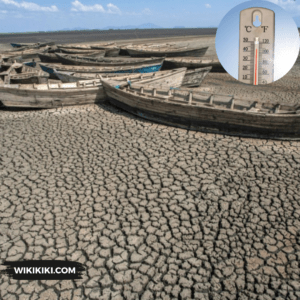The European Union’s Copernicus Climate Change Service has declared 2023 as the hottest year ever recorded. The revelation comes after months of careful analysis of climatic data, revealing a trend that poses severe consequences for our planet’s future.

Also Read: Mount Merapi Erupts: 11 Climbers Dead, 12 Missing on Indonesian Volcano
Copernicus reveals that every month since June 2023 has set a new record for being the hottest of its kind.
The latest milestone was November, registering a 1.75 degrees Celsius above the pre-industrial average. This warmth, with ocean waters between 60ºN and 60ºS reaching the highest temperatures on record.
The global average temperature for January to November 2023 sits at 1.46 degrees Celsius above the pre-industrial average.
This places the world dangerously close to breaching the 1.5 degrees Celsius global warming threshold outlined in the Paris Agreement. Scientists say that crossing this threshold could lead to challenges for ecosystems and human adaptation.
Copernicus deputy director Samantha Burgess underlines the severity of the situation, stating that 2023 has experienced six record-breaking months and two record-breaking seasons.
The temperatures contribute to the extreme weather events, including heatwaves, droughts, hurricanes, flooding, and wildfires.
The World Meteorological Organization (WMO) warns that the rate of climate change has surged, making the past decade the warmest on record.
Also Read: Thousands Protest in Brussels, Demand Action Against Climate Change
As representatives from nearly 200 countries convene at the COP28 summit in Dubai, the urgency to address climate change is palpable. Greenhouse gas emissions, primarily from the burning of fossil fuels, remain a central topic of discussion.
Scientists stress the importance of transitioning from traditional energy sources like coal, natural gas, and oil to renewable energy alternatives such as wind and solar power.
Studies indicate that increasing renewable energy consumption can reduce carbon emissions. While progress has been made globally, there is still a gap between commitments.
The U.S. generating more electricity from solar and wind than from coal for five consecutive months. The debate at COP28 is around whether to phase out or phase down fossil fuels, with implications for the speed and strength of the global transition.
Carlo Buontempo director of the Copernicus Climate Change Service, says that changes must occur to further temperature increases.
The correlation between rising greenhouse gas concentrations and temperatures reinforces the need for urgent action.
The impacts of heatwaves, droughts, and other climate-related events will persist unless a strategy, including reaching net-zero emissions, is implemented.
Also Read: Cyclone Michaung: flights Cancelled, Schools Shut as Rain Lashes Chennai
Showcasing real-life experiences from around the world. From scorching temperatures in Phoenix, Arizona, leading to the largest homeless encampment, to the impact on agriculture and wildlife, the consequences of a warming planet are felt across diverse communities.
The COP28 summit emerges as a moment for global leaders to commit to changes in climate policies. The choice between phasing out or phasing down fossil fuels reflects the ongoing debate on the level of commitment required.
The urgency to align strategies, reduce emissions, and embrace renewable energy sources is addressed by climate envoy John Kerry.
Scientific projections based on ice cores, tree rings, and other proxies suggest that 2023 could be the warmest year in more than 100,000 years.
The warmth is attributed to a combination of El Niño and human-induced climate change. As temperatures continue to rise, concerns mount over the long-term impacts, with scientists worried about the world staying above the 1.5 degrees Celsius threshold.
Researchers warn of 26 Earth tipping points that could trigger catastrophes, including melting ice sheets and glacier loss.
A separate report from the World Meteorological Organization underlines the situation, highlighting the past decade as the hottest year on record. The loss of glaciers and the rise in sea levels during this period indicate the pace of climate change.
Also Read: COP28 Set to Happen in Dubai from November 28 to December 12

/cloudfront-us-east-2.images.arcpublishing.com/reuters/HZHZLGWJCJPDBM2NEYQAU5US6Q.jpg)

.png?itok=ZfWIyreN)


















